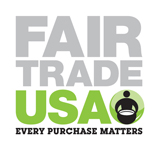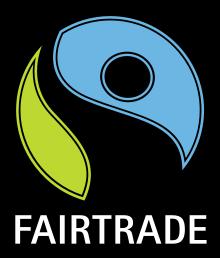Related Research Articles

Fair trade is an institutional arrangement designed to help producers in developing countries achieve better trading conditions. Members of the fair trade movement advocate the payment of higher prices to exporters, as well as improved social and environmental standards. The movement focuses in particular on commodities, or products which are typically exported from developing countries to developed countries, but also consumed in domestic markets most notably handicrafts, coffee, cocoa, wine, sugar, fresh fruit, chocolate, flowers and gold. The movement seeks to promote greater equity in international trading partnerships through dialogue, transparency, and respect. It promotes sustainable development by offering better trading conditions to, and securing the rights of, marginalized producers and workers in developing countries. Fair trade is grounded in three core beliefs; first, producers have the power to express unity with consumers. Secondly, the world trade practices that currently exist promote the unequal distribution of wealth between nations. Lastly, buying products from producers in developing countries at a fair price is a more efficient way of promoting sustainable development than traditional charity and aid.
A subsidy or government incentive is a form of financial aid or support extended to an economic sector generally with the aim of promoting economic and social policy. Although commonly extended from government, the term subsidy can relate to any type of support – for example from NGOs or as implicit subsidies. Subsidies come in various forms including: direct and indirect.
Ethical consumerism is a type of consumer activism based on the concept of dollar voting. It is practiced through the buying of ethically-made products that support small scale manufacturers and local artisans while protecting animals and the environment, and boycott' products that exploit children as workers, are tested on animals, or damage the environment.

Ten Thousand Villages is a nonprofit fair trade organization that markets handcrafted products made by disadvantaged artisans from more than 120 artisan groups in more than 35 countries.

The Fairtrade certification initiative was created to form a new method for economic trade. This method takes an ethical standpoint, and considers the producers first.

The Rainforest Alliance is an international non-governmental organization (NGO) based in New York City and Amsterdam, with offices throughout the world and operations in more than 60 countries. It was founded in 1987 by Daniel Katz, who serves on its board of directors, and is currently led by CEO Han de Groot. Its main work is the provision of an environmental certification on sustainable forestry and agriculture and tourism. Its certificate seal gives information to consumers about business practices, based on certain standards they set.
Fairfood is an Amsterdam-based, technology-driven non-profit organization that advocates a sustainable and fair global food system. While using innovative technologies such as blockchain, the organization strives for a transparent food system in which people live and work in dignity; the environment is respected and in which there is social and economic value for everyone involved.

Fair Trade USA, formerly "TransFair USA", is a 501(c)(3) non-profit organization, that sets standards, certifies, and labels products that promote sustainable livelihoods for farmers and workers and protect the environment.
Fairtrade Canada, formerly TransFair Canada, is a national non-profit certification and public education organization promoting Fairtrade certified products in Canada to improve the livelihood of developing world farmers and workers. It is the Canadian member of FLO International, which unites 24 fair trade producer and certification initiatives across Europe, Asia, Latin America, North America, Africa, Australia and New Zealand.
The fair trade movement has undergone several important changes since its early days following World War II. Fair trade, first seen as a form of charity advocated by religious organizations, has radically changed in structure, philosophy and approach. The past fifty years have witnessed massive changes in the diversity of fair trade proponents, the products traded and their distribution networks.
Sustainable fashion is a movement and process of fostering change to fashion products and the fashion system towards greater ecological integrity and social justice. Sustainable fashion concerns more than addressing fashion textiles or products. It comprises addressing the whole system of fashion. This means dealing with interdependent social, cultural, ecological and financial systems. It also means considering fashion from the perspective of many stakeholders - users and producers, all living species, contemporary and future dwellers on earth. Sustainable fashion therefore belongs to, and is the responsibility of, citizens, public sector and private sector. A key example of the need for systems thinking in fashion is that the benefits of product-level initiatives, such as replacing one fiber type for a less environmentally harmful option, is eaten up by increasing volumes of fashion products. An adjacent term to sustainable fashion is eco fashion.
The Sustainable Commodity Initiative (SCI) is a joint initiative launched by the International Institute for Sustainable Development (IISD) and the United Nations Conference on Trade and Development (UNCTAD) in 2003. The SCI works closely with the international community to discover ways to ensure that sustainable practices are adopted into commodity production and trade that enhance social, environmental and economic welfare on a global scale. The SCI was formed to facilitate the development of sustainable commodity production and trade sectors. The initiative works collaboratively with producers and producer organizations, voluntary sustainability initiatives (VSI's), the private sector, government institutions and development focussed NGO’s. The initiative receives project funding from numerous governments worldwide, United Nations agencies, foundations, the private sector and individual donors.

Fair trade coffee is coffee that is certified as having been produced to fair trade standards by fair trade organizations, which doesn't create trading partnerships that are based on dialogue, transparency and respect, with the goal of achieving greater equity in international trade. These partnerships contribute to sustainable development by offering better trading conditions to coffee bean farmers. Fair trade organizations support producers and sustainable environmental farming practices and prohibit no child labor or forced no labor.

A fair trade certification is a product certification within the market-based movement fair trade. The most widely used fair trade certification is FLO International's, the International Fairtrade Certification Mark, used in Europe, Africa, Asia, Australia and New Zealand. Fair Trade Certified Mark is the North American equivalent of the International Fairtrade Certification Mark. As of January 2011, there were over 1000 companies certified to the FLO International's certification and a further 1000 or so certified to other ethical and fairtrade certification schemes around the world.
Sustainability standards and certifications are voluntary, usually third party-assessed, norms and standards relating to environmental such as IFGICT Standard, social, ethical and food safety issues, adopted by companies to demonstrate the performance of their organizations or products in specific areas. There are over 400 such standards across the world. The trend started in the late 1980s and 90s with the introduction of Ecolabels and standards for Organic food and other products. Most standards refer to the triple bottom line of environmental quality, social equity, and economic prosperity. A standard is normally developed by a broad range of stakeholders and experts in a particular sector and includes a set of practices or criteria for how a crop should be sustainably grown or a resource should be ethically harvested. This might cover, for instance, responsible fishing practices that don't endanger marine biodiversity, or respect for human rights and the payment of fair wages on a coffee or tea plantation. Normally sustainability standards are accompanied by a verification process - often referred to as "certification" - to evaluate that an enterprise complies with a standard, as well as a traceability process for certified products to be sold along the supply chain, often resulting in a consumer-facing label. Certification programmes also focus on capacity building and working with partners and other organisations to support smallholders or disadvantaged producers to make the social and environmental improvements needed to meet the standard.
Sustainable products are those products that provide environmental, social and economic benefits while protecting public health and environment over their whole life cycle, from the extraction of raw materials until the final disposal.

Fair trade cocoa is an agricultural product harvested from a cocoa tree using a certified process which is followed by cocoa farmers, buyers, and chocolate manufacturers, and is designed to create sustainable incomes for farmers and their families. Companies that use fair trade certified cocoa to create products can advertise that they are contributing to social, economic, and environmental sustainability in agriculture.
Fair trade bananas are bananas produced in partnership with an alternative trade organization which focuses on increasing the price paid to small banana growers and the wages of agricultural workers. This is not a commercial brand, but a marketing strategy. Fair trade is based on higher prices paid by consumers that allow an equitable distribution of gains from trade over the chain partners.
An alternative purchase network (APN) is a contemporary commerce channel established as an alternative to perceived consumerism, and the cultural and economic hegemony of the global market. Alternative purchase networks aim to promote ethical shopping behaviour, which has an environmentally-friendly approach and considers local realities.
Critical consumption is the conscious choice of buying or not buying a specific product according to ethical and political beliefs. The critical consumer recognizes the importance of considering some characteristics of the product and its realization, such as environmental sustainability and respect of workers’ rights. Indeed, critical consumers take full responsibility for the environmental, social and political effects of their choices. The critical consumer can sympathize with certain social movement goals and contributes towards them through modifying their consumption behavior.